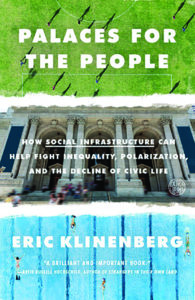 Palaces for the People: How social infrastructure can help fight inequality, polarization, and the decline of civic life.
Palaces for the People: How social infrastructure can help fight inequality, polarization, and the decline of civic life.
Eric Klinenberg
New York: Crown, 2018
I have often said that the best place to view a community is from behind the circulation desk at the public library. From that vantage point, I can see everyone. Individuals. Families. People with resources. Those who are struggling. Patrons with very different backgrounds, ideals, and needs. The most satisfying piece is that this diverse group of patrons are all at the library together, receiving the same services, and participating in the same events.
I recently said to someone that libraries, with our wide array of patrons, were the secret to healing our fractured society. That person reminded me of a book from last year: Palaces for the People: How social infrastructure can help fight inequality, polarization, and the decline of civic life. Sociologist Eric Klinenberg argues in favor of more “social infrastructure,” or places, such as libraries, community gardens, and churches, where people can co-exist in public.
Palaces for the People (titled after the phrase Andrew Carnegie used to describe the libraries he built) explores major contemporary problems such as crime, education, climate change, and polarization. Klinenberg argues that conventional infrastructure changes alone cannot solve these issues. We can only move closer to working on solutions when there is also investment in social infrastructure. Buildings such as libraries provide places for human connectedness, programs, and learning, and they need to be built and maintained just as urgently as other infrastructure projects. Without social infrastructure, there will not be social bridging. Without bridging, our society will be further polarized and our civic life will fully erode.
Palaces for the People is available at 12 CLAMS libraries, including Wellfleet, Eastham, Provincetown, and Truro.
Jennifer Wertkin is Library Director at the Wellfleet Public Library. Look for recommendations from the Outer Cape’s other libraries as we develop “At the Library” and our books department.
